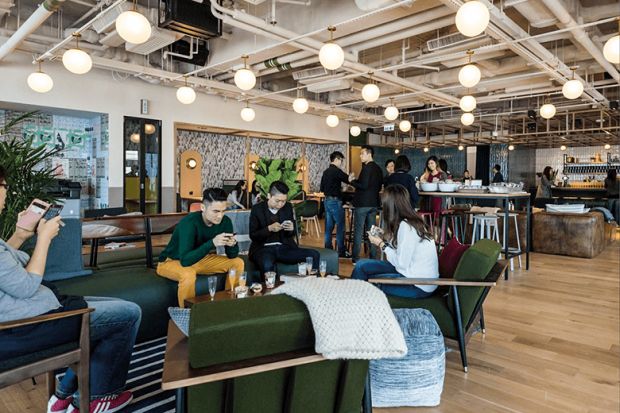Browse the full Times Higher Education Asia-Pacific University Rankings 2018 results
“Learning is the tool of individual and organisational advancement. This process of learning is more than just acquiring formal education… learning-by-doing is paramount.”
These insights from the Organisation for Economic Cooperation and Development stand up as well today as they did when they appeared in the group’s seminal 1996 report The Knowledge-Based Economy. Learning-by-doing – in the form of skills – the report stated, was essential for workers to handle “codified knowledge”, the commodity that firms were using to drive productivity in the still emerging knowledge economy.
Fast-forward almost a quarter of a century and the world is vastly different.
Upwork, a freelancing platform, recently released research in its Freelancing in America report. The headline? “Freelancers predicted to become the US workforce majority by 2027, with nearly 50 per cent of millennial workers already freelancing.” In the Asia-Pacific region, WeWork, a global network of co-working spaces used by freelancers, recently raised $1.4 billion (£1 billion) to expand in China, Japan and South-east Asia. Welcome to one of the emerging futures of work in the digital economy.
How do we prepare students for the digital economy? The 1996 OECD report is a helpful guide. First, let’s look at some context and activity in Asia-Pacific universities.
In the digital economy, data is the new commodity driving productivity, but in an environment in which knowledge is increasingly codified and handled by sophisticated cognitive and automation technologies. Artificial intelligence, for instance, is ever more adept at analysing data, categorising information, recognising patterns and making decisions. From journalism to medical diagnosis, from HR to audit, from logistics to manufacturing, AI continues to encroach on what has been human worker territory. And, in doing so, challenging the traditional business of universities.
In May in Australia, the consultancy firm EY released The University of the Future report. The finding that led newspaper headlines across the country was: “40 per cent of degrees will soon be obsolete”. According to the report, “Australia’s current university model, with its focus on ‘traditional’ undergraduate degrees, will be less relevant in this future world.”
At the recent conference of the Asia-Pacific Association for International Education, Singapore’s minister for education, Ong Ye Kung, highlighted changes to the Singaporean university curriculum that stress the importance of experiential learning and digital literacy. Over in the Philippines, the 2017-22 Philippine Development Plan puts in sharp focus the need to develop “21st-century competencies” at its universities.
Indeed, governments across Asia-Pacific from Indonesia to Japan, from South Korea to China – and Australia too – are developing similar policy positions focused on universities’ role in developing digital skills.
Initiatives that provide students with digital skills are steps in the right direction for the future of work, but not leaps.
Tom Goodwin discusses the paradigm shift into the digital economy in his new book, Digital Darwinism. “When we face something new we find it hard to really rethink…We anchor it in processes, systems, infrastructure, [and] assumptions of the past.”
Indeed, the EY report says that of the nearly 1,200 graduates surveyed in the research, “42 per cent felt [that] their degree structure [was] outdated, [and] lacked digital skills training, complex problem solving, and team work”. This is no doubt true.
But to paraphrase Goodwin, digital skills cannot simply be an add-on to a traditional university education structured to serve the knowledge economy. Learning must be constructed around the emerging futures of work in the digital economy.
This is the essence of the OECD report. It recognised that to drive productivity at the wavefront of new technologies required learning-by-doing in “non-formal settings” (read “real-world situations”).
Back to the freelance economy. According to the New York Times columnist Thomas Friedman, who works with business strategist Heather McGowan on the future of work, “work is being disconnected from jobs, and jobs and work are being disconnected from companies, which are increasingly becoming platforms”. Like Upwork.
Platforms are flat, fast and furious. Where ecosystems thrive on disruptive and creative forces. Where value is created in networks, not chains. Where growth trumps innovation. Where risk-taking is not optional. Where there is no right formula for success.
Freelancing and other emerging futures of work – like agile approaches, exponential organisations (those that leverage/exploit exponential technologies to accelerate growth) and Industry 4.0 – are rewriting the rules of how economic value is created. It is incumbent on universities to provide authentic opportunities for students to learn-by-doing in these environments.
Through an increasing focus on digital skills, Asia-Pacific’s universities are beginning to look forward into the new world of work. By throwing our students into the real future of work situations – such as co-working spaces – we will help ensure they learn how to thrive in the digital economy.
Sean Gallagher is director of the Centre for the New Workforce at Swinburne University of Technology in Australia.
POSTSCRIPT:
Print headline: Digital immersion
Register to continue
Why register?
- Registration is free and only takes a moment
- Once registered, you can read 3 articles a month
- Sign up for our newsletter
Subscribe
Or subscribe for unlimited access to:
- Unlimited access to news, views, insights & reviews
- Digital editions
- Digital access to THE’s university and college rankings analysis
Already registered or a current subscriber? Login








